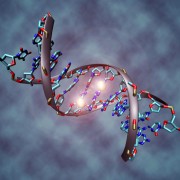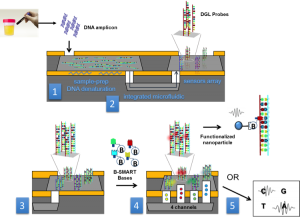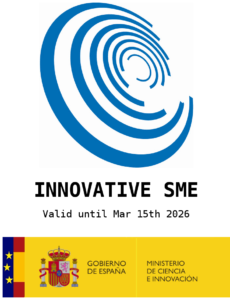H2020 Project LiqBiopSens: A new liquid biopsy platform for early detection of colorrectal cancer
December 10th 2015
We are proud to announce that the European Comission awarded a grant of a total value of 2’7M euros to our project LIQBIOPSENS for early detection of colorectal cancer by carrying out liquid biopsy. The grant was awarded within Horizon2020 and specifically in the call entitled “ICT-28-2015: Cross cutting ICT Key Enabling Technologies”.
AWSensors will coordinate this H2020 project during the next 3 years (2016-2018). The overall aim of this project is the further development and validation in real settings of a novel diagnostic platform for the early and fast detection of circulating tumor DNA (ctDNA) and their KRAS and BRAF mutations associated to colorectal cancer through blood samples.
Liquid Biopsy platform LiqBiopSens features
The main features of LiqBiopSens are:
- Reliability (detection rates vary from 95-100 %)
- Low-Cost
- Sensitivity (in the zM range)
- Multiplexing capabilities (analysis of 27 KRAS and BRAF mutations simultaneously)
- Short analysis time (30-60 min.)
- User-friendly interface
- Flexibility
LIQBIOPSENS platform is based on the integration of two novel complementary technologies:
- DGL© technology property of DestiNA Genomics Ltd, capable of delivering faster, more error-free detection of DNA and their mutations than current enzyme-based detection systems, making ‘false positive’ results a thing of the past.
- A novel high resolution acoustic wave microsensor technology property of AWSensors, that allows an accurate, inexpensive, label-free, direct and real-time transduction method to quantitatively evaluate the results of the application of the mentioned DGL© technique.
However, solution proposed by the LIQBIOPSENS project relies on the multidisciplinary integration of different key enabled technologies. Accordingly, LiqBiopSens will be accomplished by AWSensors and Destina Genomics in collaboration with the following partners:
- Public Health insurance in Andalusia (Spain).
- Catholique University of Louvain, the research partner with wide expertise in microfluidics (Belgium).
- FORTH, Institute of Molecular Biology and Biotechnology, the research partner with deep expertise in the application of acoustic sensors in DNA analysis (Greece).
- Sistemas Genómicos
Liquid Biopsy platform LiqBiopSens concept
The operating concept of our project is described in the following representative scheme:
ctDNA amplicons produced in chamber (1) are denatured and transferred to the sensors surface via microfluidics (2) where hybridization with DGL probes takes place; mutation‐discrimination is carried out during the injection (3) of novel probes which click selectively on the target DNA (4) while acoustic detection exploits functionalized nanoparticles (5).
Colorectal cancer, the second most common cause of cancer death
The most frequently occurring forms of cancer in the EU are colorectal, breast, prostate and lung cancers. In men, lung cancer is the most frequent cause of cancer death, while in women, it is breast cancer. In both men and women, colorectal cancer is the second most common cause of cancer death.
The “gold standard” for identifying the type and extent of a cancer is a tissue biopsy, in which a small sample of tissue is taken from the suspected tumour and histologically examined. While this procedure can provide important information about the patient disease, tissue biopsy can be painful, represents a single snap-shot in time, is subjected to significant selection bias and if the tumour tested was first detected by palpation or imaging, it may already be so large that the disease is well advanced. Furthermore, when the tumour tissue is removed or it is inaccessible, these genotyping techniques are impossible. Therefore, cancer remains a ghost disease when primary tumours are removed through surgery, meaning that there are not tools to assess the efficiency of treatments or prevent metastasis.
Liquid Biopsy, a revolution in the fight against cancer
It has long been known that solid tumors release DNA in the blood and the load of circulating tumor DNA (ctDNA) has been correlated to staging and prognosis. However, only recent advances in the sensitivity and accuracy of DNA analysis have allowed for genotyping of somatic changes found in tumors by interrogating ctDNA. This technique is known as ‘Liquid Biopsy’ and it is based on the analysis of a biomarker that can be easily isolated from many body fluids (blood, saliva, urine, ascites, pleural effusion, etc.).
Successful implementations of liquid biopsy techniques to track tumor dynamics in real time and for the early detection, such as LIQBIOPSENS, are going to revolutionise how clinicians fight against cancer.




